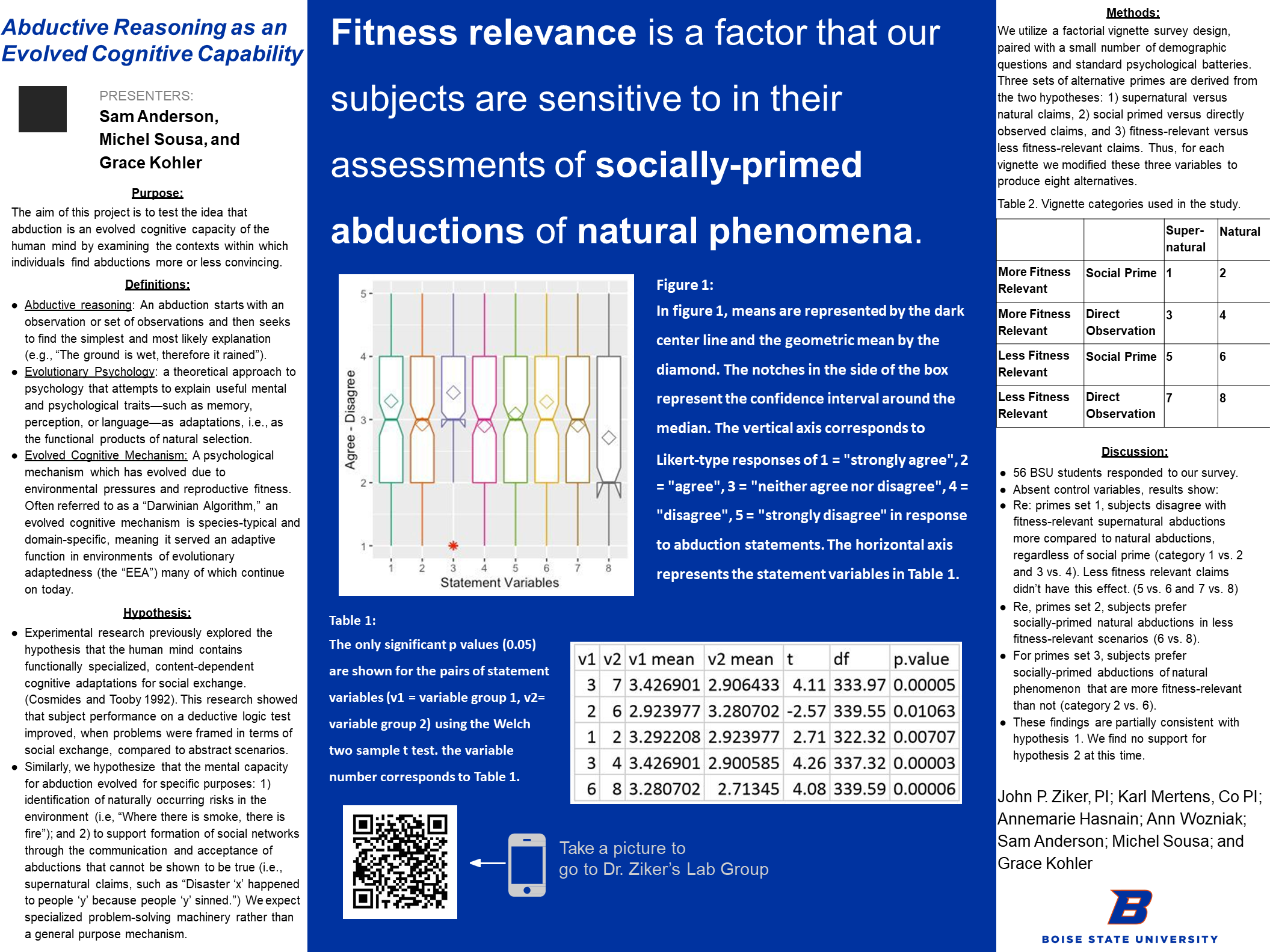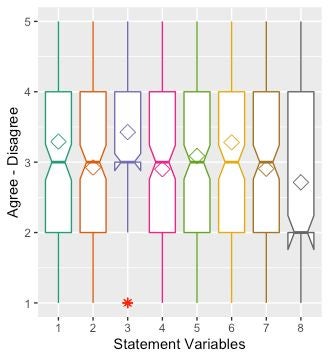Samuel Anderson, Dr. John P. Ziker, Karl Mertens, Annemarie Hasnain, Ann Wozniak, Michel Sousa, Grace Kohler

Fitness relevance is a factor that our subjects are sensitive to in their assessments of socially-primed abductions of natural phenomena

In figure 1, means are represented by the dark center line and the geometric mean by the diamond. The notches in the side of the box represent the confidence interval around the median. The vertical axis corresponds to Likert-type responses of 1 = “strongly agree”, 2 = “agree”, 3 = “neither agree nor disagree”, 4 = “disagree”, 5 = “strongly disagree” in response to abduction statements. The horizontal axis represents the statement variables in Table 1.
Table 1: The only significant p values (0.05) are shown for the pairs of statement variables (v1 = variable group 1, v2= variable group 2) using the Welch two sample t test. the variable number corresponds to Table 1.
| v1 | v2 | v1 mean | v2 mean | t | df | p.value |
|---|---|---|---|---|---|---|
| 3 | 7 | 3.426901 | 2.906433 | 4.11 | 333.97 | 0.00005 |
| 2 | 6 | 2.903977 | 3.280702 | -2.57 | 339.55 | 0.01063 |
| 1 | 2 | 3.292208 | 2.923977 | 2.71 | 322.32 | 0.00707 |
| 3 | 4 | 3.426901 | 2.900585 | 4.26 | 337.32 | 0.00003 |
| 6 | 8 | 3.280702 | 2.71345 | 4.08 | 339.59 | 0.00006 |
Purpose:
The aim of this project is to test the idea that abduction is an evolved cognitive capacity of the human mind by examining the contexts within which individuals find abductions more or less convincing
Definitions:
- Abductive reasoning: An abduction starts with an observation or set of observations and then seeks to find the simplest and most likely explanation (e.g., “The ground is wet, therefore it rained”).
- Evolutionary Psychology: a theoretical approach to psychology that attempts to explain useful mental and psychological traits—such as memory, perception, or language—as adaptations, i.e., as the functional products of natural selection.
- Evolved Cognitive Mechanism: A psychological mechanism which has evolved due to environmental pressures and reproductive fitness. Often referred to as a “Darwinian Algorithm,” an evolved cognitive mechanism is species-typical and domain-specific, meaning it served an adaptive function in environments of evolutionary adaptedness (the “EEA”) many of which continue on today.
Hypothesis:
Experimental research previously explored the hypothesis that the human mind contains functionally specialized, content-dependent cognitive adaptations for social exchange. (Cosmides and Tooby 1992). This research showed that subject performance on a deductive logic test improved, when problems were framed in terms of social exchange, compared to abstract scenarios.
Similarly, we hypothesize that the mental capacity for abduction evolved for specific purposes: 1) identification of naturally occurring risks in the environment (i.e, “Where there is smoke, there is fire”); and 2) to support formation of social networks through the communication and acceptance of abductions that cannot be shown to be true (i.e., supernatural claims, such as “Disaster ‘x’ happened to people ‘y’ because people ‘y’ sinned.”) We expect specialized problem-solving machinery rather than a general purpose mechanism.
Methods:
We utilize a factorial vignette survey design, paired with a small number of demographic questions and standard psychological batteries. Three sets of alternative primes are derived from the two hypotheses: 1) supernatural versus natural claims, 2) social primed versus directly observed claims, and 3) fitness-relevant versus less fitness-relevant claims. Thus, for each vignette we modified these three variables to produce eight alternatives.
Table 2. Vignette categories used in the study.
| Fitness | Prime/Observation | Supernatural | Natural |
|---|---|---|---|
| More Fitness Relevant | Social Prime | 1 | 2 |
| More Fitness Relevant | Direct Observation | 3 | 4 |
| Less Fitness Relevant | Social Prime | 5 | 6 |
| Less Fitness Relevant | Direct Observation | 7 | 8 |
Discussion:
- 56 BSU students responded to our survey.
- Absent control variables, results show:
- Re: primes set 1, subjects disagree with fitness-relevant supernatural abductions more compared to natural abductions, regardless of social prime (category 1 vs. 2 and 3 vs. 4). Less fitness relevant claims didn’t have this effect. (5 vs. 6 and 7 vs. 8)
- Re, primes set 2, subjects prefer socially-primed natural abductions in less fitness-relevant scenarios (6 vs. 8).
- For primes set 3, subjects prefer socially-primed abductions of natural phenomenon that are more fitness-relevant than not (category 2 vs. 6).
- These findings are partially consistent with hypothesis 1. We find no support for hypothesis 2 at this time.
Additional Information
For questions or comments about this research, go to Dr. Ziker’s lab group Google Site or contact Samuel Anderson at samanderson802@u.boisestate.edu.